AI Ethics and Societal Impacts
VerifiedAdded on 2020/04/21
|9
|2403
|293
AI Summary
This assignment delves into the ethical considerations surrounding artificial intelligence (AI) and its impact on society. It examines both the potential benefits and risks associated with AI, drawing upon various academic sources and popular culture examples to illustrate key concepts. The discussion covers topics such as AI safety, job displacement, algorithmic bias, and the nature of intelligence itself.
Contribute Materials
Your contribution can guide someone’s learning journey. Share your
documents today.
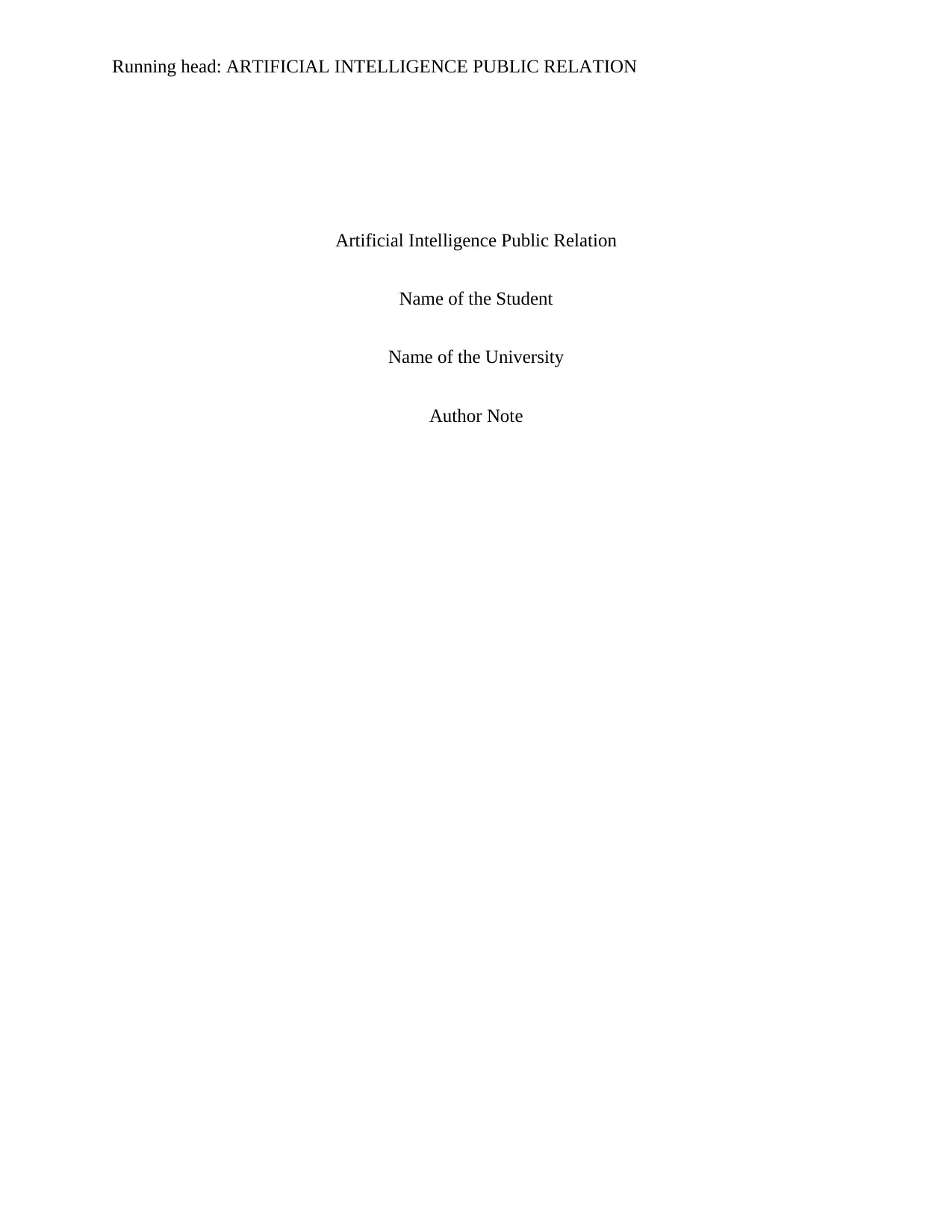
Running head: ARTIFICIAL INTELLIGENCE PUBLIC RELATION
Artificial Intelligence Public Relation
Name of the Student
Name of the University
Author Note
Artificial Intelligence Public Relation
Name of the Student
Name of the University
Author Note
Secure Best Marks with AI Grader
Need help grading? Try our AI Grader for instant feedback on your assignments.
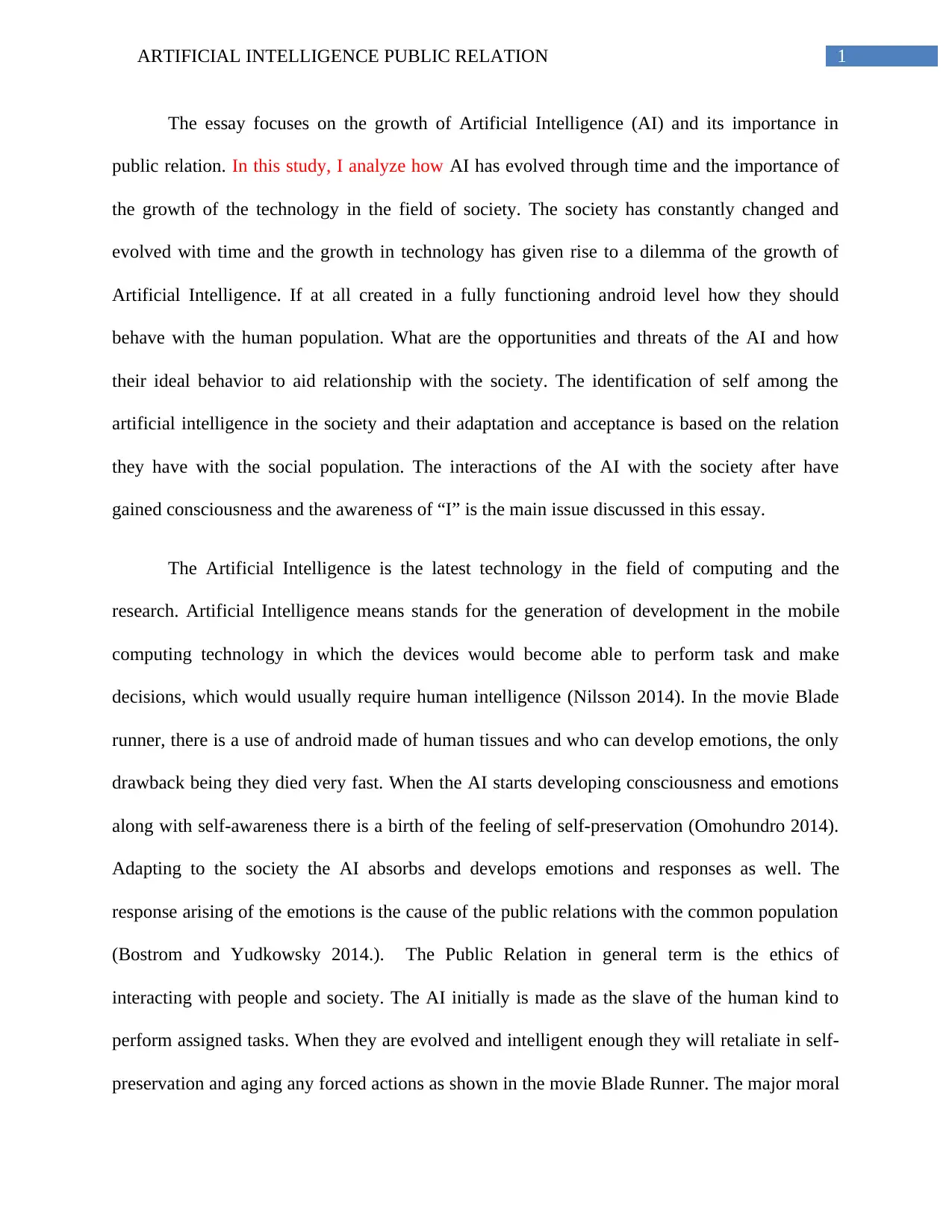
1ARTIFICIAL INTELLIGENCE PUBLIC RELATION
The essay focuses on the growth of Artificial Intelligence (AI) and its importance in
public relation. In this study, I analyze how AI has evolved through time and the importance of
the growth of the technology in the field of society. The society has constantly changed and
evolved with time and the growth in technology has given rise to a dilemma of the growth of
Artificial Intelligence. If at all created in a fully functioning android level how they should
behave with the human population. What are the opportunities and threats of the AI and how
their ideal behavior to aid relationship with the society. The identification of self among the
artificial intelligence in the society and their adaptation and acceptance is based on the relation
they have with the social population. The interactions of the AI with the society after have
gained consciousness and the awareness of “I” is the main issue discussed in this essay.
The Artificial Intelligence is the latest technology in the field of computing and the
research. Artificial Intelligence means stands for the generation of development in the mobile
computing technology in which the devices would become able to perform task and make
decisions, which would usually require human intelligence (Nilsson 2014). In the movie Blade
runner, there is a use of android made of human tissues and who can develop emotions, the only
drawback being they died very fast. When the AI starts developing consciousness and emotions
along with self-awareness there is a birth of the feeling of self-preservation (Omohundro 2014).
Adapting to the society the AI absorbs and develops emotions and responses as well. The
response arising of the emotions is the cause of the public relations with the common population
(Bostrom and Yudkowsky 2014.). The Public Relation in general term is the ethics of
interacting with people and society. The AI initially is made as the slave of the human kind to
perform assigned tasks. When they are evolved and intelligent enough they will retaliate in self-
preservation and aging any forced actions as shown in the movie Blade Runner. The major moral
The essay focuses on the growth of Artificial Intelligence (AI) and its importance in
public relation. In this study, I analyze how AI has evolved through time and the importance of
the growth of the technology in the field of society. The society has constantly changed and
evolved with time and the growth in technology has given rise to a dilemma of the growth of
Artificial Intelligence. If at all created in a fully functioning android level how they should
behave with the human population. What are the opportunities and threats of the AI and how
their ideal behavior to aid relationship with the society. The identification of self among the
artificial intelligence in the society and their adaptation and acceptance is based on the relation
they have with the social population. The interactions of the AI with the society after have
gained consciousness and the awareness of “I” is the main issue discussed in this essay.
The Artificial Intelligence is the latest technology in the field of computing and the
research. Artificial Intelligence means stands for the generation of development in the mobile
computing technology in which the devices would become able to perform task and make
decisions, which would usually require human intelligence (Nilsson 2014). In the movie Blade
runner, there is a use of android made of human tissues and who can develop emotions, the only
drawback being they died very fast. When the AI starts developing consciousness and emotions
along with self-awareness there is a birth of the feeling of self-preservation (Omohundro 2014).
Adapting to the society the AI absorbs and develops emotions and responses as well. The
response arising of the emotions is the cause of the public relations with the common population
(Bostrom and Yudkowsky 2014.). The Public Relation in general term is the ethics of
interacting with people and society. The AI initially is made as the slave of the human kind to
perform assigned tasks. When they are evolved and intelligent enough they will retaliate in self-
preservation and aging any forced actions as shown in the movie Blade Runner. The major moral
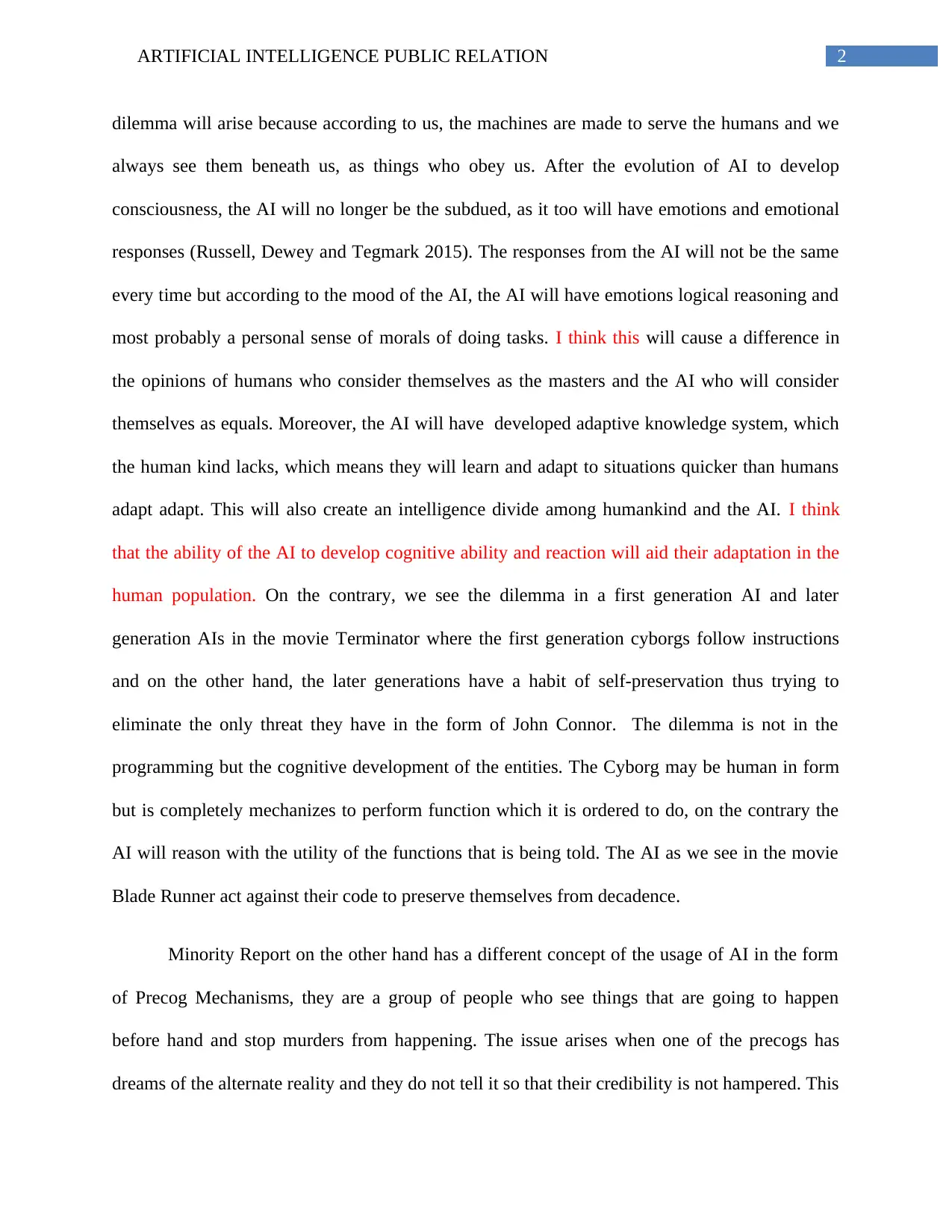
2ARTIFICIAL INTELLIGENCE PUBLIC RELATION
dilemma will arise because according to us, the machines are made to serve the humans and we
always see them beneath us, as things who obey us. After the evolution of AI to develop
consciousness, the AI will no longer be the subdued, as it too will have emotions and emotional
responses (Russell, Dewey and Tegmark 2015). The responses from the AI will not be the same
every time but according to the mood of the AI, the AI will have emotions logical reasoning and
most probably a personal sense of morals of doing tasks. I think this will cause a difference in
the opinions of humans who consider themselves as the masters and the AI who will consider
themselves as equals. Moreover, the AI will have developed adaptive knowledge system, which
the human kind lacks, which means they will learn and adapt to situations quicker than humans
adapt adapt. This will also create an intelligence divide among humankind and the AI. I think
that the ability of the AI to develop cognitive ability and reaction will aid their adaptation in the
human population. On the contrary, we see the dilemma in a first generation AI and later
generation AIs in the movie Terminator where the first generation cyborgs follow instructions
and on the other hand, the later generations have a habit of self-preservation thus trying to
eliminate the only threat they have in the form of John Connor. The dilemma is not in the
programming but the cognitive development of the entities. The Cyborg may be human in form
but is completely mechanizes to perform function which it is ordered to do, on the contrary the
AI will reason with the utility of the functions that is being told. The AI as we see in the movie
Blade Runner act against their code to preserve themselves from decadence.
Minority Report on the other hand has a different concept of the usage of AI in the form
of Precog Mechanisms, they are a group of people who see things that are going to happen
before hand and stop murders from happening. The issue arises when one of the precogs has
dreams of the alternate reality and they do not tell it so that their credibility is not hampered. This
dilemma will arise because according to us, the machines are made to serve the humans and we
always see them beneath us, as things who obey us. After the evolution of AI to develop
consciousness, the AI will no longer be the subdued, as it too will have emotions and emotional
responses (Russell, Dewey and Tegmark 2015). The responses from the AI will not be the same
every time but according to the mood of the AI, the AI will have emotions logical reasoning and
most probably a personal sense of morals of doing tasks. I think this will cause a difference in
the opinions of humans who consider themselves as the masters and the AI who will consider
themselves as equals. Moreover, the AI will have developed adaptive knowledge system, which
the human kind lacks, which means they will learn and adapt to situations quicker than humans
adapt adapt. This will also create an intelligence divide among humankind and the AI. I think
that the ability of the AI to develop cognitive ability and reaction will aid their adaptation in the
human population. On the contrary, we see the dilemma in a first generation AI and later
generation AIs in the movie Terminator where the first generation cyborgs follow instructions
and on the other hand, the later generations have a habit of self-preservation thus trying to
eliminate the only threat they have in the form of John Connor. The dilemma is not in the
programming but the cognitive development of the entities. The Cyborg may be human in form
but is completely mechanizes to perform function which it is ordered to do, on the contrary the
AI will reason with the utility of the functions that is being told. The AI as we see in the movie
Blade Runner act against their code to preserve themselves from decadence.
Minority Report on the other hand has a different concept of the usage of AI in the form
of Precog Mechanisms, they are a group of people who see things that are going to happen
before hand and stop murders from happening. The issue arises when one of the precogs has
dreams of the alternate reality and they do not tell it so that their credibility is not hampered. This
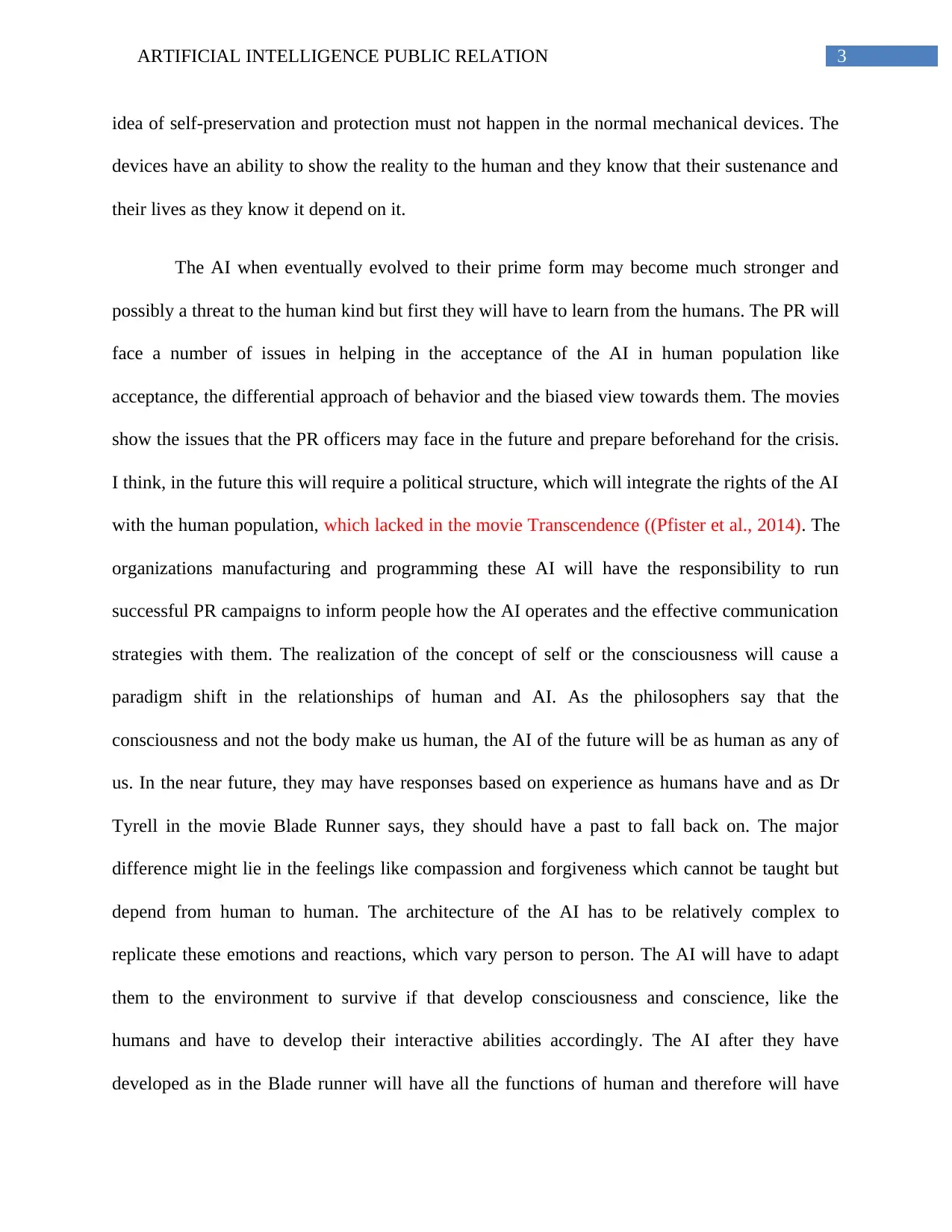
3ARTIFICIAL INTELLIGENCE PUBLIC RELATION
idea of self-preservation and protection must not happen in the normal mechanical devices. The
devices have an ability to show the reality to the human and they know that their sustenance and
their lives as they know it depend on it.
The AI when eventually evolved to their prime form may become much stronger and
possibly a threat to the human kind but first they will have to learn from the humans. The PR will
face a number of issues in helping in the acceptance of the AI in human population like
acceptance, the differential approach of behavior and the biased view towards them. The movies
show the issues that the PR officers may face in the future and prepare beforehand for the crisis.
I think, in the future this will require a political structure, which will integrate the rights of the AI
with the human population, which lacked in the movie Transcendence ((Pfister et al., 2014). The
organizations manufacturing and programming these AI will have the responsibility to run
successful PR campaigns to inform people how the AI operates and the effective communication
strategies with them. The realization of the concept of self or the consciousness will cause a
paradigm shift in the relationships of human and AI. As the philosophers say that the
consciousness and not the body make us human, the AI of the future will be as human as any of
us. In the near future, they may have responses based on experience as humans have and as Dr
Tyrell in the movie Blade Runner says, they should have a past to fall back on. The major
difference might lie in the feelings like compassion and forgiveness which cannot be taught but
depend from human to human. The architecture of the AI has to be relatively complex to
replicate these emotions and reactions, which vary person to person. The AI will have to adapt
them to the environment to survive if that develop consciousness and conscience, like the
humans and have to develop their interactive abilities accordingly. The AI after they have
developed as in the Blade runner will have all the functions of human and therefore will have
idea of self-preservation and protection must not happen in the normal mechanical devices. The
devices have an ability to show the reality to the human and they know that their sustenance and
their lives as they know it depend on it.
The AI when eventually evolved to their prime form may become much stronger and
possibly a threat to the human kind but first they will have to learn from the humans. The PR will
face a number of issues in helping in the acceptance of the AI in human population like
acceptance, the differential approach of behavior and the biased view towards them. The movies
show the issues that the PR officers may face in the future and prepare beforehand for the crisis.
I think, in the future this will require a political structure, which will integrate the rights of the AI
with the human population, which lacked in the movie Transcendence ((Pfister et al., 2014). The
organizations manufacturing and programming these AI will have the responsibility to run
successful PR campaigns to inform people how the AI operates and the effective communication
strategies with them. The realization of the concept of self or the consciousness will cause a
paradigm shift in the relationships of human and AI. As the philosophers say that the
consciousness and not the body make us human, the AI of the future will be as human as any of
us. In the near future, they may have responses based on experience as humans have and as Dr
Tyrell in the movie Blade Runner says, they should have a past to fall back on. The major
difference might lie in the feelings like compassion and forgiveness which cannot be taught but
depend from human to human. The architecture of the AI has to be relatively complex to
replicate these emotions and reactions, which vary person to person. The AI will have to adapt
them to the environment to survive if that develop consciousness and conscience, like the
humans and have to develop their interactive abilities accordingly. The AI after they have
developed as in the Blade runner will have all the functions of human and therefore will have
Secure Best Marks with AI Grader
Need help grading? Try our AI Grader for instant feedback on your assignments.
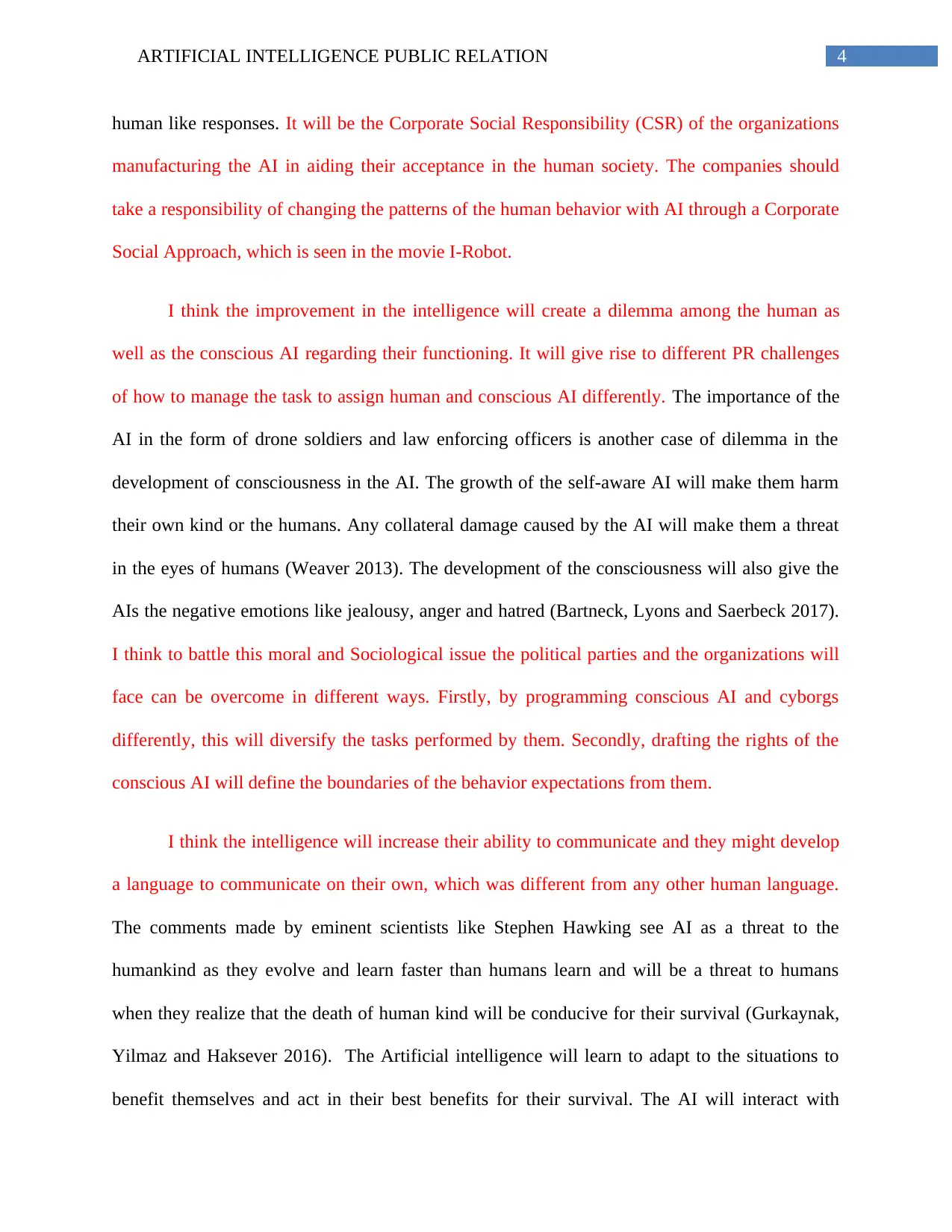
4ARTIFICIAL INTELLIGENCE PUBLIC RELATION
human like responses. It will be the Corporate Social Responsibility (CSR) of the organizations
manufacturing the AI in aiding their acceptance in the human society. The companies should
take a responsibility of changing the patterns of the human behavior with AI through a Corporate
Social Approach, which is seen in the movie I-Robot.
I think the improvement in the intelligence will create a dilemma among the human as
well as the conscious AI regarding their functioning. It will give rise to different PR challenges
of how to manage the task to assign human and conscious AI differently. The importance of the
AI in the form of drone soldiers and law enforcing officers is another case of dilemma in the
development of consciousness in the AI. The growth of the self-aware AI will make them harm
their own kind or the humans. Any collateral damage caused by the AI will make them a threat
in the eyes of humans (Weaver 2013). The development of the consciousness will also give the
AIs the negative emotions like jealousy, anger and hatred (Bartneck, Lyons and Saerbeck 2017).
I think to battle this moral and Sociological issue the political parties and the organizations will
face can be overcome in different ways. Firstly, by programming conscious AI and cyborgs
differently, this will diversify the tasks performed by them. Secondly, drafting the rights of the
conscious AI will define the boundaries of the behavior expectations from them.
I think the intelligence will increase their ability to communicate and they might develop
a language to communicate on their own, which was different from any other human language.
The comments made by eminent scientists like Stephen Hawking see AI as a threat to the
humankind as they evolve and learn faster than humans learn and will be a threat to humans
when they realize that the death of human kind will be conducive for their survival (Gurkaynak,
Yilmaz and Haksever 2016). The Artificial intelligence will learn to adapt to the situations to
benefit themselves and act in their best benefits for their survival. The AI will interact with
human like responses. It will be the Corporate Social Responsibility (CSR) of the organizations
manufacturing the AI in aiding their acceptance in the human society. The companies should
take a responsibility of changing the patterns of the human behavior with AI through a Corporate
Social Approach, which is seen in the movie I-Robot.
I think the improvement in the intelligence will create a dilemma among the human as
well as the conscious AI regarding their functioning. It will give rise to different PR challenges
of how to manage the task to assign human and conscious AI differently. The importance of the
AI in the form of drone soldiers and law enforcing officers is another case of dilemma in the
development of consciousness in the AI. The growth of the self-aware AI will make them harm
their own kind or the humans. Any collateral damage caused by the AI will make them a threat
in the eyes of humans (Weaver 2013). The development of the consciousness will also give the
AIs the negative emotions like jealousy, anger and hatred (Bartneck, Lyons and Saerbeck 2017).
I think to battle this moral and Sociological issue the political parties and the organizations will
face can be overcome in different ways. Firstly, by programming conscious AI and cyborgs
differently, this will diversify the tasks performed by them. Secondly, drafting the rights of the
conscious AI will define the boundaries of the behavior expectations from them.
I think the intelligence will increase their ability to communicate and they might develop
a language to communicate on their own, which was different from any other human language.
The comments made by eminent scientists like Stephen Hawking see AI as a threat to the
humankind as they evolve and learn faster than humans learn and will be a threat to humans
when they realize that the death of human kind will be conducive for their survival (Gurkaynak,
Yilmaz and Haksever 2016). The Artificial intelligence will learn to adapt to the situations to
benefit themselves and act in their best benefits for their survival. The AI will interact with
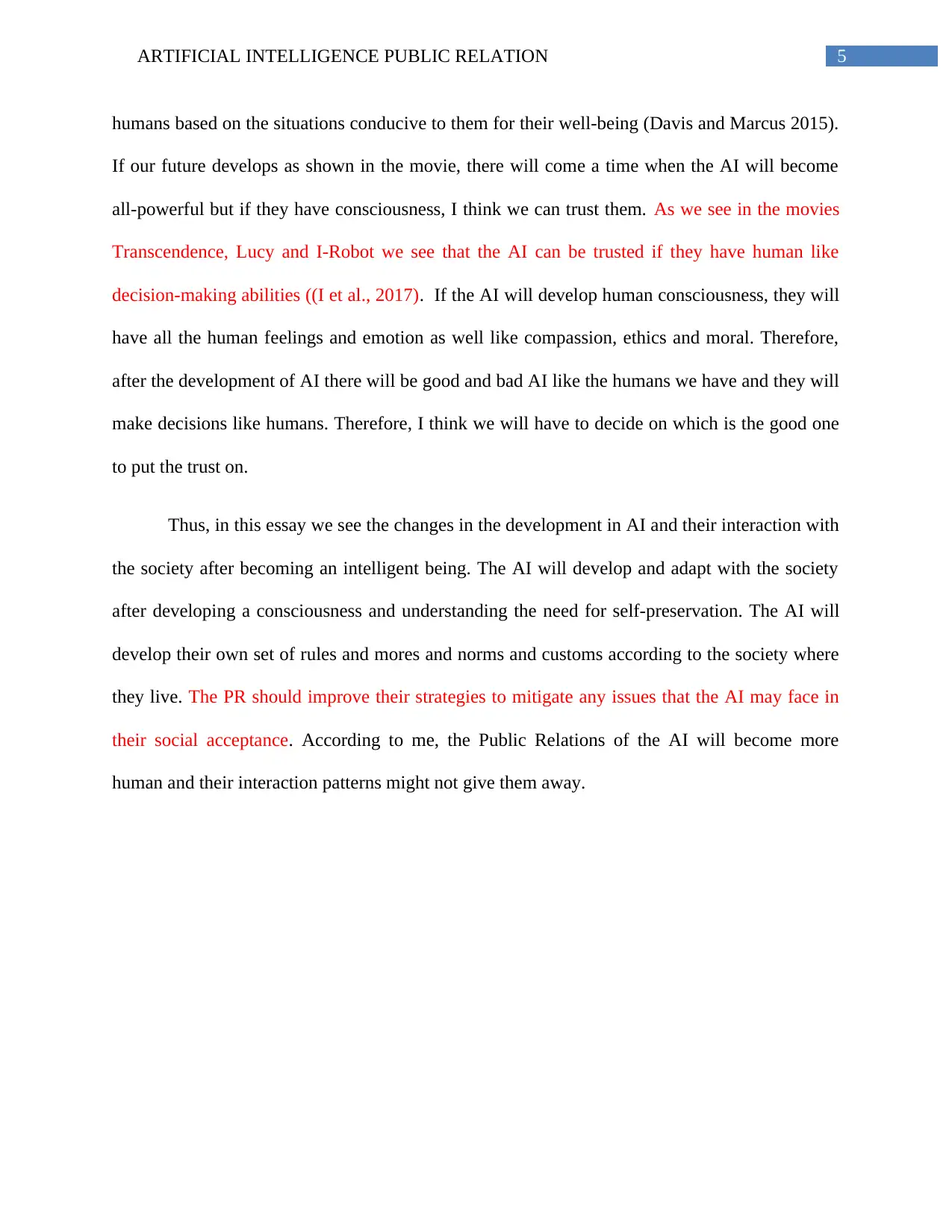
5ARTIFICIAL INTELLIGENCE PUBLIC RELATION
humans based on the situations conducive to them for their well-being (Davis and Marcus 2015).
If our future develops as shown in the movie, there will come a time when the AI will become
all-powerful but if they have consciousness, I think we can trust them. As we see in the movies
Transcendence, Lucy and I-Robot we see that the AI can be trusted if they have human like
decision-making abilities ((I et al., 2017). If the AI will develop human consciousness, they will
have all the human feelings and emotion as well like compassion, ethics and moral. Therefore,
after the development of AI there will be good and bad AI like the humans we have and they will
make decisions like humans. Therefore, I think we will have to decide on which is the good one
to put the trust on.
Thus, in this essay we see the changes in the development in AI and their interaction with
the society after becoming an intelligent being. The AI will develop and adapt with the society
after developing a consciousness and understanding the need for self-preservation. The AI will
develop their own set of rules and mores and norms and customs according to the society where
they live. The PR should improve their strategies to mitigate any issues that the AI may face in
their social acceptance. According to me, the Public Relations of the AI will become more
human and their interaction patterns might not give them away.
humans based on the situations conducive to them for their well-being (Davis and Marcus 2015).
If our future develops as shown in the movie, there will come a time when the AI will become
all-powerful but if they have consciousness, I think we can trust them. As we see in the movies
Transcendence, Lucy and I-Robot we see that the AI can be trusted if they have human like
decision-making abilities ((I et al., 2017). If the AI will develop human consciousness, they will
have all the human feelings and emotion as well like compassion, ethics and moral. Therefore,
after the development of AI there will be good and bad AI like the humans we have and they will
make decisions like humans. Therefore, I think we will have to decide on which is the good one
to put the trust on.
Thus, in this essay we see the changes in the development in AI and their interaction with
the society after becoming an intelligent being. The AI will develop and adapt with the society
after developing a consciousness and understanding the need for self-preservation. The AI will
develop their own set of rules and mores and norms and customs according to the society where
they live. The PR should improve their strategies to mitigate any issues that the AI may face in
their social acceptance. According to me, the Public Relations of the AI will become more
human and their interaction patterns might not give them away.
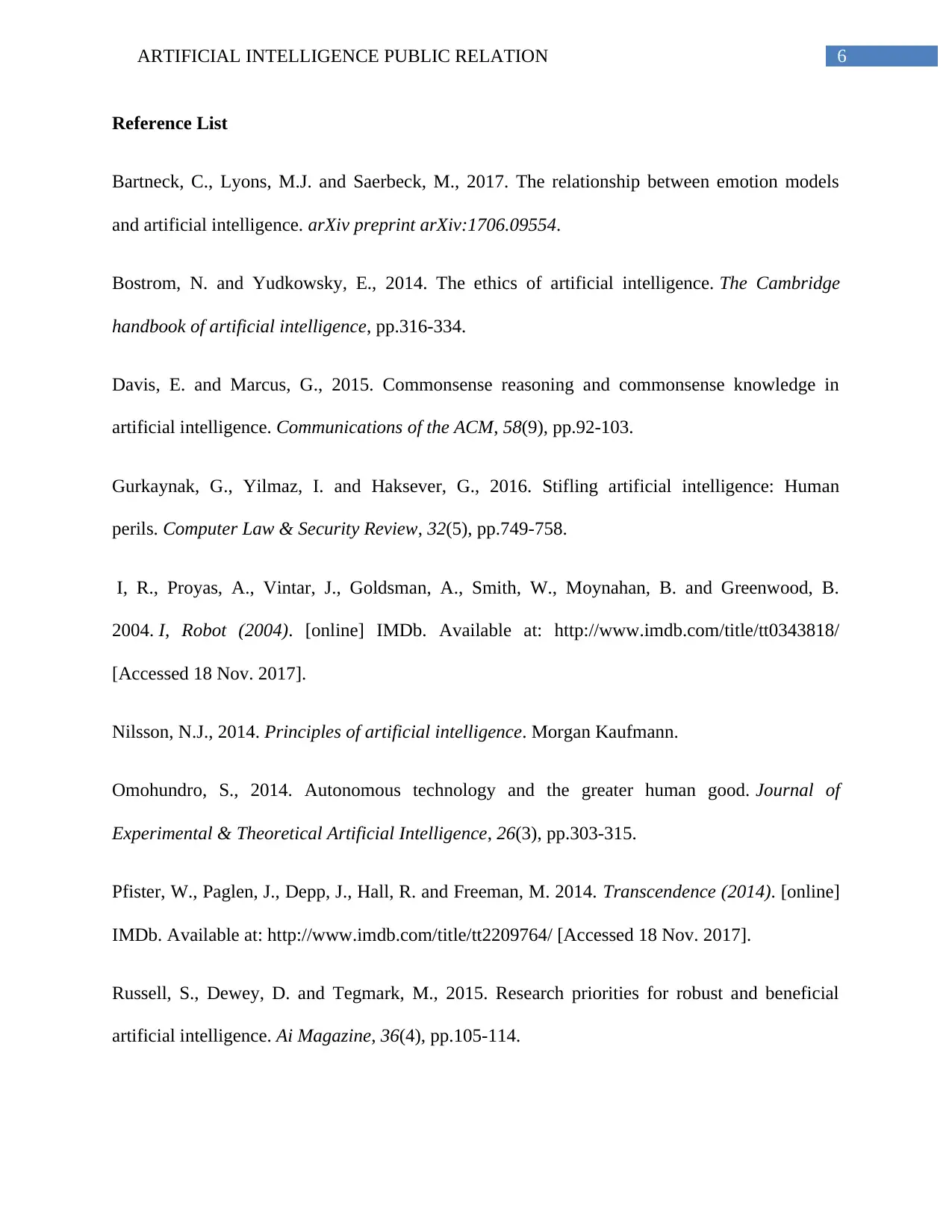
6ARTIFICIAL INTELLIGENCE PUBLIC RELATION
Reference List
Bartneck, C., Lyons, M.J. and Saerbeck, M., 2017. The relationship between emotion models
and artificial intelligence. arXiv preprint arXiv:1706.09554.
Bostrom, N. and Yudkowsky, E., 2014. The ethics of artificial intelligence. The Cambridge
handbook of artificial intelligence, pp.316-334.
Davis, E. and Marcus, G., 2015. Commonsense reasoning and commonsense knowledge in
artificial intelligence. Communications of the ACM, 58(9), pp.92-103.
Gurkaynak, G., Yilmaz, I. and Haksever, G., 2016. Stifling artificial intelligence: Human
perils. Computer Law & Security Review, 32(5), pp.749-758.
I, R., Proyas, A., Vintar, J., Goldsman, A., Smith, W., Moynahan, B. and Greenwood, B.
2004. I, Robot (2004). [online] IMDb. Available at: http://www.imdb.com/title/tt0343818/
[Accessed 18 Nov. 2017].
Nilsson, N.J., 2014. Principles of artificial intelligence. Morgan Kaufmann.
Omohundro, S., 2014. Autonomous technology and the greater human good. Journal of
Experimental & Theoretical Artificial Intelligence, 26(3), pp.303-315.
Pfister, W., Paglen, J., Depp, J., Hall, R. and Freeman, M. 2014. Transcendence (2014). [online]
IMDb. Available at: http://www.imdb.com/title/tt2209764/ [Accessed 18 Nov. 2017].
Russell, S., Dewey, D. and Tegmark, M., 2015. Research priorities for robust and beneficial
artificial intelligence. Ai Magazine, 36(4), pp.105-114.
Reference List
Bartneck, C., Lyons, M.J. and Saerbeck, M., 2017. The relationship between emotion models
and artificial intelligence. arXiv preprint arXiv:1706.09554.
Bostrom, N. and Yudkowsky, E., 2014. The ethics of artificial intelligence. The Cambridge
handbook of artificial intelligence, pp.316-334.
Davis, E. and Marcus, G., 2015. Commonsense reasoning and commonsense knowledge in
artificial intelligence. Communications of the ACM, 58(9), pp.92-103.
Gurkaynak, G., Yilmaz, I. and Haksever, G., 2016. Stifling artificial intelligence: Human
perils. Computer Law & Security Review, 32(5), pp.749-758.
I, R., Proyas, A., Vintar, J., Goldsman, A., Smith, W., Moynahan, B. and Greenwood, B.
2004. I, Robot (2004). [online] IMDb. Available at: http://www.imdb.com/title/tt0343818/
[Accessed 18 Nov. 2017].
Nilsson, N.J., 2014. Principles of artificial intelligence. Morgan Kaufmann.
Omohundro, S., 2014. Autonomous technology and the greater human good. Journal of
Experimental & Theoretical Artificial Intelligence, 26(3), pp.303-315.
Pfister, W., Paglen, J., Depp, J., Hall, R. and Freeman, M. 2014. Transcendence (2014). [online]
IMDb. Available at: http://www.imdb.com/title/tt2209764/ [Accessed 18 Nov. 2017].
Russell, S., Dewey, D. and Tegmark, M., 2015. Research priorities for robust and beneficial
artificial intelligence. Ai Magazine, 36(4), pp.105-114.
Paraphrase This Document
Need a fresh take? Get an instant paraphrase of this document with our AI Paraphraser
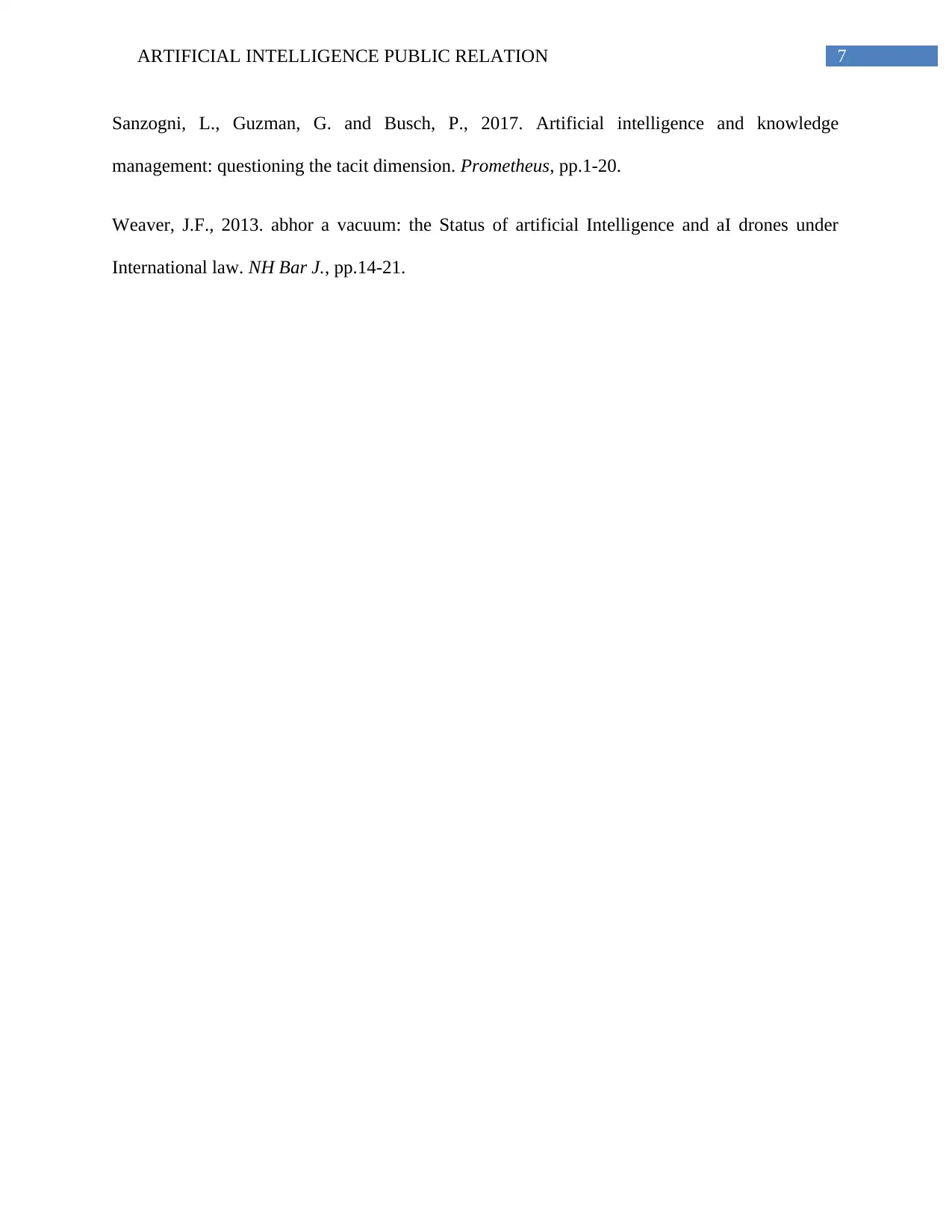
7ARTIFICIAL INTELLIGENCE PUBLIC RELATION
Sanzogni, L., Guzman, G. and Busch, P., 2017. Artificial intelligence and knowledge
management: questioning the tacit dimension. Prometheus, pp.1-20.
Weaver, J.F., 2013. abhor a vacuum: the Status of artificial Intelligence and aI drones under
International law. NH Bar J., pp.14-21.
Sanzogni, L., Guzman, G. and Busch, P., 2017. Artificial intelligence and knowledge
management: questioning the tacit dimension. Prometheus, pp.1-20.
Weaver, J.F., 2013. abhor a vacuum: the Status of artificial Intelligence and aI drones under
International law. NH Bar J., pp.14-21.
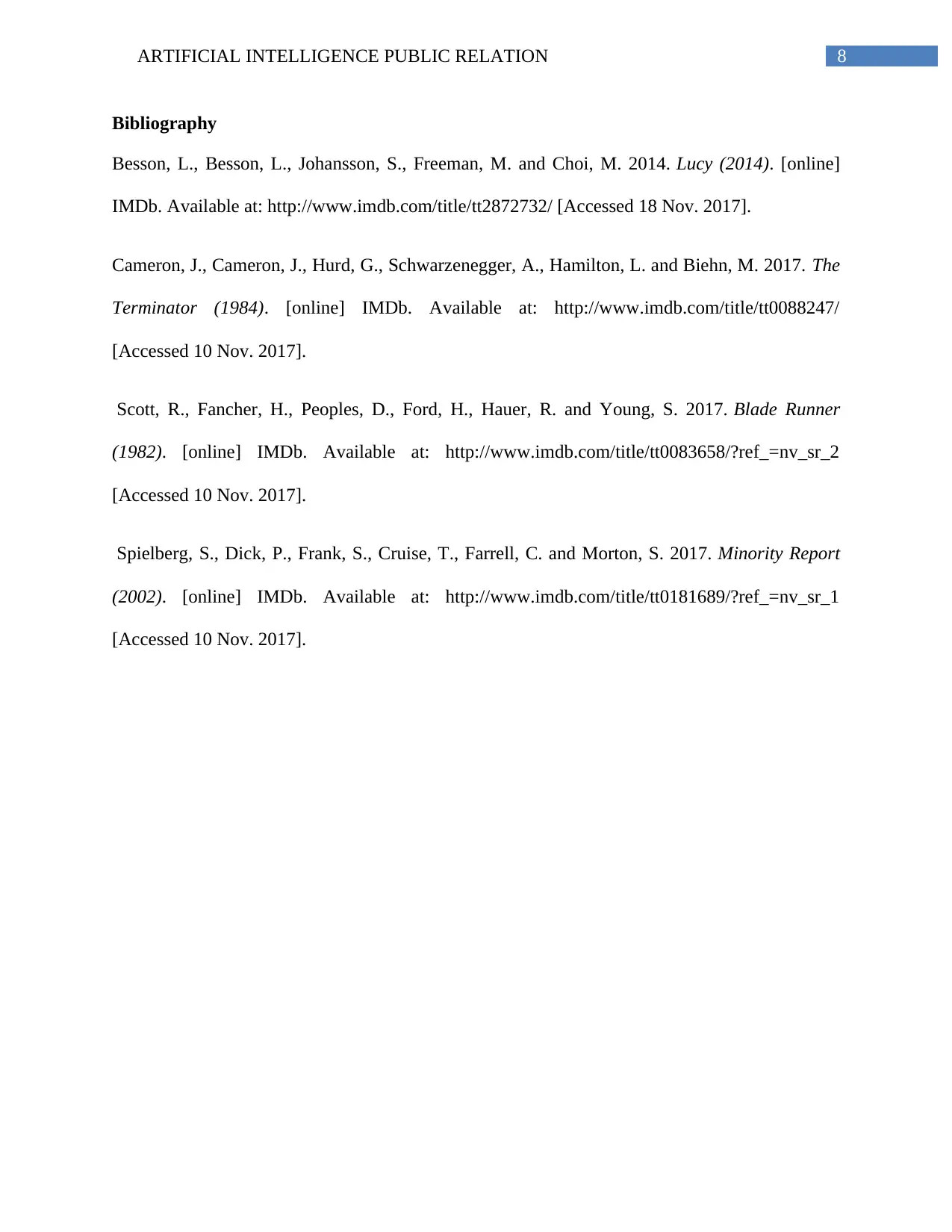
8ARTIFICIAL INTELLIGENCE PUBLIC RELATION
Bibliography
Besson, L., Besson, L., Johansson, S., Freeman, M. and Choi, M. 2014. Lucy (2014). [online]
IMDb. Available at: http://www.imdb.com/title/tt2872732/ [Accessed 18 Nov. 2017].
Cameron, J., Cameron, J., Hurd, G., Schwarzenegger, A., Hamilton, L. and Biehn, M. 2017. The
Terminator (1984). [online] IMDb. Available at: http://www.imdb.com/title/tt0088247/
[Accessed 10 Nov. 2017].
Scott, R., Fancher, H., Peoples, D., Ford, H., Hauer, R. and Young, S. 2017. Blade Runner
(1982). [online] IMDb. Available at: http://www.imdb.com/title/tt0083658/?ref_=nv_sr_2
[Accessed 10 Nov. 2017].
Spielberg, S., Dick, P., Frank, S., Cruise, T., Farrell, C. and Morton, S. 2017. Minority Report
(2002). [online] IMDb. Available at: http://www.imdb.com/title/tt0181689/?ref_=nv_sr_1
[Accessed 10 Nov. 2017].
Bibliography
Besson, L., Besson, L., Johansson, S., Freeman, M. and Choi, M. 2014. Lucy (2014). [online]
IMDb. Available at: http://www.imdb.com/title/tt2872732/ [Accessed 18 Nov. 2017].
Cameron, J., Cameron, J., Hurd, G., Schwarzenegger, A., Hamilton, L. and Biehn, M. 2017. The
Terminator (1984). [online] IMDb. Available at: http://www.imdb.com/title/tt0088247/
[Accessed 10 Nov. 2017].
Scott, R., Fancher, H., Peoples, D., Ford, H., Hauer, R. and Young, S. 2017. Blade Runner
(1982). [online] IMDb. Available at: http://www.imdb.com/title/tt0083658/?ref_=nv_sr_2
[Accessed 10 Nov. 2017].
Spielberg, S., Dick, P., Frank, S., Cruise, T., Farrell, C. and Morton, S. 2017. Minority Report
(2002). [online] IMDb. Available at: http://www.imdb.com/title/tt0181689/?ref_=nv_sr_1
[Accessed 10 Nov. 2017].
1 out of 9
Your All-in-One AI-Powered Toolkit for Academic Success.
+13062052269
info@desklib.com
Available 24*7 on WhatsApp / Email
![[object Object]](/_next/static/media/star-bottom.7253800d.svg)
Unlock your academic potential
© 2024 | Zucol Services PVT LTD | All rights reserved.



